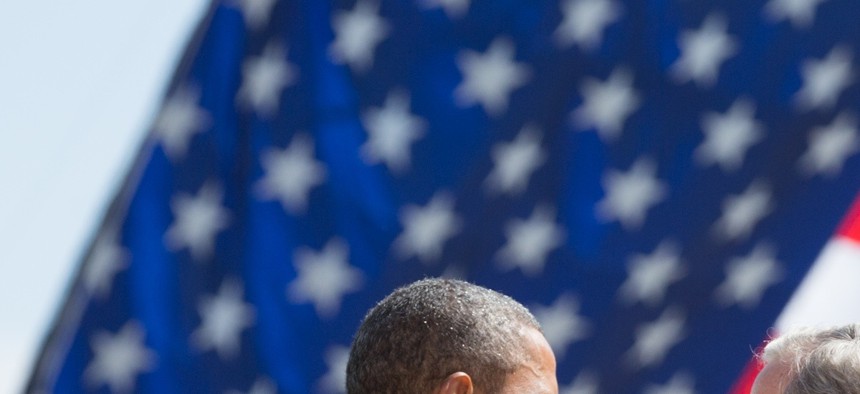
Paul Morse/George W. Bush Center
A Portrait of Two Presidents, Reconciling Their Political Struggles
On Sunday, Bob Schieffer got Barack Obama and George W. Bush to wax philosophical about the value of their time in the White House.
In a special 60th anniversary episode of CBS's Face the Nation on Sunday, host Bob Schieffer got Barack Obama and George W. Bush to wax philosophical about their respective legacies as president.
In a prerecorded interview in the Oval Office, Schieffer addressed criticism that if Obama were more of a back-slapping, wheeling-and-dealing president like Lyndon B. Johnson, he wouldn't have so many difficulties working with Congress. Does the president even enjoy the game of politics?
"If your name is Barack Hussein Obama, you had to have liked politics in order to get into this office," Obama replied. "The fact is that we wouldn't have gotten health care passed if there wasn't a whole bunch of arm twisting. We would not have been able to make progress on the deficit if I hadn't been willing to cut some deals with Republicans."
But while Obama openly enjoys the politics of the campaign trail and winning over voters, he allowed that this passion doesn't always translate to winning over fellow politicians.
"Campaigning and governance are two different things," Obama said. "When you start governing, there is a tendency sometimes for me to start thinking, 'As long as I get the policy right, then that's what should matter.' "
And while Obama defended his policy record, he admitted a "failure of politics" in selling those policies to American voters.
"One thing that I do need to constantly remind myself and my team of is, it's not enough to build the better mousetrap. People don't automatically come beating to your door. We've got to sell it. We've got to reach out to the other side, and where possible, persuade," Obama said.
"And I think there are times—there's no doubt about it—where I think we have not been successful in going out there and letting people know what it is that we're trying to do and why this is the right direction. So there is a failure of politics there that we've got to improve on."
In his own interview with Schieffer, Bush echoed Obama's frustration in being able to persuade the American public on the White House's agenda. Bush told Schieffer he was "dismayed" about his father losing reelection in 1992, and about the inability of the White House to convince voters that the Gulf War was just as important as domestic matters.
The more obvious failure of politics for Obama came on Tuesday night, when Democrats in Congress suffered embarrassing defeats in both chambers. Schieffer pointed to a recent Washington Post story, in which Sen. Harry Reid's chief of staff aired his grievances on working with the White House during the midterms.
"The buck stops with me," Obama said in reference to Democrats' losses on Tuesday. "I've got to take responsibility." He did not elaborate on whether he thought that responsibility was deserved.
Still, Obama said he has retained optimism throughout his presidency, despite the trials of the past six years.
"I still consider this the best job on Earth," he told Schieffer, "and I'm going to try to squeeze every last ounce of possibility and the ability to do good out of this job in these last two years."
Looking forward to 2016, Bush speculated on his own brother's potential presidential bid.
"I think he'd be a very good president. I understand the decision-making process pretty well, and I know that he's wrestling with the decision," Bush said about his brother, former Florida Gov. Jeb Bush.
And the odds of that decision coming out in favor of a presidential run?
"I think it's 50-50," Bush said. "He and I are very close. On the other hand, he's not here knocking on my door agonizing about the decision. He knows exactly the ramifications on family, for example. He's seen his dad and his brother go through the presidency. I would give it a toss-up. I know this about Jeb: He's not afraid to succeed. In other words, he knows he could do the job. Nor is he afraid to fail."
George W. Bush, who has maintained a low profile since he left the White House, said he would support his brother in whatever capacity he needs.
"I will be whatever he wants," Bush said. "I will be one of his strongest backers. If he wants me out there publicly, I'll be out there publicly. If he wants me behind the scenes, I'll be behind the scenes."
This article appears in the November 10, 2014 edition of NJ Daily.







